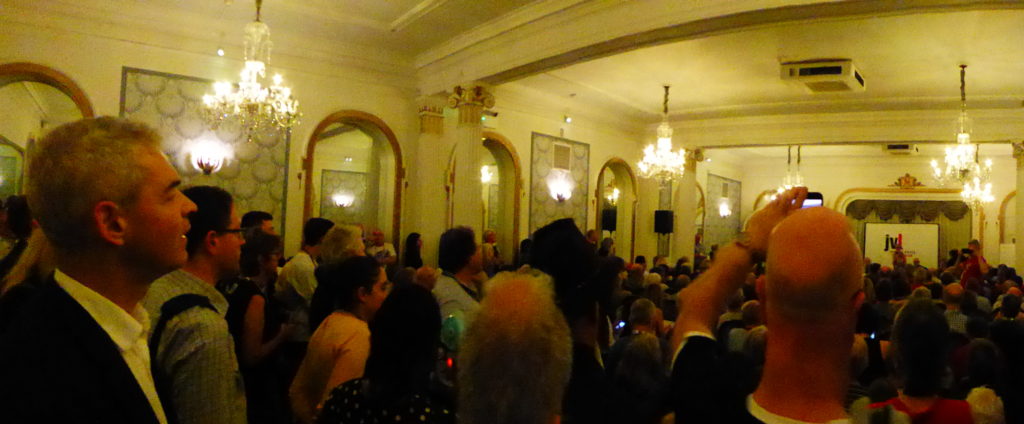Mike Cushman
Jewish Voice for Labour must be greatly encouraged by the reception it received at Labour Party Conference.
JVL Triumph
As a brand new organisation with very limited resources and no paid staff, they did not anticipate the scale of its impact. Its launch meeting attracted over 300 people when JVL had been doubtful about filling a room that seats 180. As well as attracting many conference delegates, leaders of two trade unions, Unite and ASLEF, attended and pledged their support. In addition to stimulating speeches, brimming with, fact and ideas from leading Israeli academic Professor Avi Shlaim, retired Appeal Court judge Sir Stephen Sedley and respected Jewish socialist activist David Rosenberg, the audience heard from leading film maker Ken Loach who spoke from the floor.

The message from all the speakers was clear, consistent and enthusiastically welcomed by the audience. There are Jewish voices that the Labour party is wilfully ignoring. The party needs to listen attentively to the whole of its Jewish membership and not just those individuals and groups who defend Israel’s crimes against humanity; its occupation of Palestinian land; and its increasingly Apartheid-like regime. The message of the meeting was clear: that antisemitism is as unwelcome in the Labour Party, as it should be everywhere; but that criticism of Israel and support for Palestinian rights is not antisemitic. Rather, JVL continues the long tradition of Jewish defence of the oppressed and recognition of the humanity of all. As descendants of victims of oppression over centuries all Jews should join with JVL in denouncing injustice.
The impact of JVL was not only at the fringe of conference. Leading JVL members Naomi Wimborne-Idrissi and Leah Levane roused conference to its feet with their calls for justice and peace in Palestine and for just procedures inside the Labour Party. Their reception paved the way for Jeremy Corbyn to pledge the Party to support Palestinian rights.
Why the rule change is inadequate and dangerous
JVL applauds the Labour Party’s renewed concern with combatting discrimination within the Party and in wider society. They recognise this has been central to Jeremy Corbyn’s entire political career. While the agreed measure on this topic avoids some of the worst features of other proposals circulated, JVL is concerned that the rule change adopted may not be effective in advancing that cause and fears its misuse. It can be seen that JVL’s anxieties are around four issues.
Firstly, the rule change does not spell out how to embody the recommendations of last year’s Chakrabarti report including that there should be no trawling of ancient social media postings in the hope of targeting specific individuals; and that all processes of investigation and discipline must be transparent and follow natural justice norms. Previous experience has been of selective vision; perverse textual interpretations; opaque procedures; and media vilification preceding hearings. The Party must determine to end such abusive ways of working.
Secondly the procedures for drawing up the code of conduct have not been specified. JVL expects that the NEC will consult with all groups that may experience discrimination and with all currents of opinion within these groups. A draft of the code must be circulated to all local parties. It is a lesson from all anti-discrimination initiatives that unless there is wide involvement from the start there is no ownership of the final process and failed implementation. There are particular issues with regard to the antisemitism aspect of the code. Over the last 18 months, criticism of Israel has, too often, been taken as evidence of antisemitism in Party disciplinary cases. The code must not include proposals that would brand anti-Zionism as antisemitism. We have seen too many examples where fear of being labelled antisemitic has silenced voices that, while critical of Israel, are in no way antisemitic. The code of conduct must not be used as a way to smuggle in a draconian reading of the IHRA (mis)definition of antisemitism.
Thirdly, it is alarming that the rule includes the notion that beliefs can be the subject of discipline. Objectionable beliefs may well give rise to statements and actions that are unacceptable. It is such statements and actions that are the appropriate object of sanction. Trying to punish belief is what Orwell derided as thought crime.
Fourthly, the new rule does not lead to a distinction that Chakrabarti clearly alluded to. Some unacceptable statements arise from ignorance and confusion and need to be addressed through education to lead the perpetrator to understand the negative consequences of their actions. Other statements and actions arise from malice and are the proper domain of disciplinary action. Neither type of hurtful action is acceptable but the way to deal with them, and to build a stronger, more inclusive party, vary.
JVL must look forward to building on its progress in Brighton and its boost in membership. It has committed itself to playing its role in strengthening the Labour Party and securing the Labour Government pledged to achieving the domestic and international justice that we desperately need.


